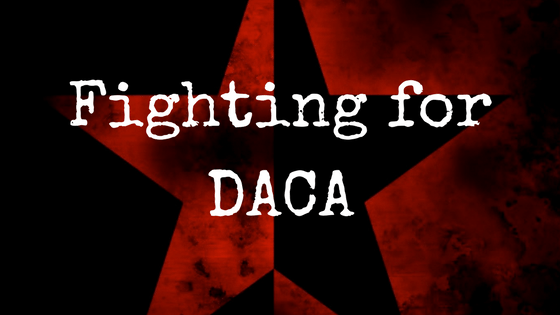EDITOR’S NOTE: This opinion piece was originally published by the author, Isaac Cuevas, at ANGELUS. He emailed us the piece and we agreed to reprint it here. We understand that this opinion piece might not be a popular one with our audience, but we are always committed to publish diverse voices on our site, even when our editorial group doesn’t necessarily agree with many points presented.


The ongoing budget dramas in Washington, D.C., have been complicated this year by negotiations over the fate of roughly 800,000 people whose futures depend on legal action to determine if they can remain in the U.S. legally.
While Congress has finally passed a spending plan, Maria Jose, a recipient of the Deferred Action for Childhood Arrivals program, joins participants at a Feb. 6 prayer service outside the U.S. Capitol to pray for Dreamers and for legislators who are working to pass immigration legislation. Washington — along with the rest of the country — remain deeply divided about the so-called ‘Dreamers.’
A note about myself for the sake of context: I am not a professional organizer or an immigration attorney. I worked as a marketing executive for most of my career, developing multicultural campaigns for many Hollywood films. I became an expert in cultural marketing and was eventually introduced to the Archdiocese of Los Angeles, where I now lead the Office of Immigration Affairs.
I came to this country with my mother when I was 2 years old from Mexico on a tourist visa. We overstayed our visa and lived here undocumented for years. I remember my parents having conversations over dinner about what to do if one of them was ever picked up by immigration officials. Luckily, my family was able to apply for legal status during the Reagan administration, and since then we have all obtained citizenship.
Recently, I found myself in a car with two DACA (Deferred Action for Childhood Arrivals) program recipients driving from central L.A. to Camarillo to speak to seminarians about our country’s broken immigration system. We each shared our immigration stories, but more interesting to me was the conversation about our place in this movement.
First there was Carlos, a filmmaker in his 20s using his creative talent to tell stories about immigration and the emotional impact politics is having on the undocumented community. He’s incredibly smart, an entrepreneur and has found an impressive way to channel his frustration with the system through his art.
The other passenger was Paulina, a young woman in her early 20s who decided to “come out of the shadows” as a DACA recipient. She also decided to use her voice as an advocate to turn her fear into empowerment.
While both of these amazing people have a different way of expressing their stories, they both agreed with the use of escalating tactics to bring about social change, even if it meant being disruptive to garner attention for this movement. This is where I disagreed.
While disruptive tactics aren’t always ineffective, I don’t agree that they would bring about meaningful immigration reform. Let me explain.
When disruptive tactics were used during the civil rights movement, they were a tool used to help amplify a message. People put their lives on the line while cameras recorded the unrest caused by civil rights demonstrations, helping bring awareness of the situation to the rest of the country.
Emmett Till’s mother had an open casket funeral for her brutally beaten son so that cameras could show the ugly consequences of hate. People could empathize with the pain of others, and those disruptive examples helped change hearts.
The tactics being used by many DACA protestors today make it harder to feel that same empathy. These protestors have drowned out elected representatives (many of whom support their cause) while speaking with chants demanding their legal status. They’ve interrupted the Macy’s Thanksgiving Day parade, forcing police to physically remove them. Recently, they blocked the entrance to Disneyland in Anaheim, California.
This behavior is exactly why a negative perception of the undocumented community exists. People with settled opinions on the immigration debate are not going to have a change of heart watching this kind of disruption.
As Paulina and Carlos heard me explain my point of view, they understood the problem that such negative press poses to their cause. So what else can be done? My answer is simple: Instead of changing minds, let’s change hearts.
It’s difficult for two people arguing about the facts of a topic to ever concede to the other’s argument. With immigration, the letter of the law —whether we agree with it or not— is where the facts reside.
The Christian thing to do is to try to understand the human dignity that all people deserve. In the case of the DACA debate, that human dignity is apparent in the life of every immigrant who has risked so much to form a better, honest life.
These are human beings who are willing to work hard, pay taxes, raise families and be productive parts of this country. These are people who feel American because they, too, have ideas, dreams and goals —and are not afraid to put in the sweat equity to obtain them.
In an address last year, Pope Francis said Christians must “not raise walls but bridges, to not respond to evil with evil, to overcome evil with good.”
Our best and brightest undocumented immigrants have an opportunity to rise to the occasion, dialing down the rhetoric and instead showcasing the talent they can offer our country. Use your stories to change hearts, not minds.
***
Isaac Cuevas is associate director of immigration affairs in the Archdiocese of Los Angeles’ Office of Government and Community Relations.


